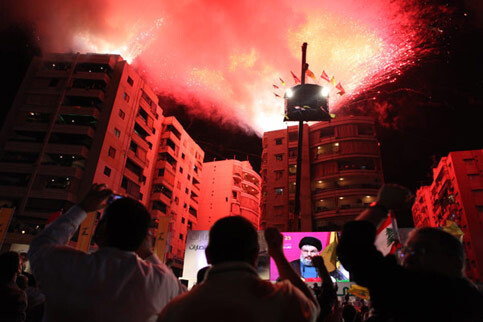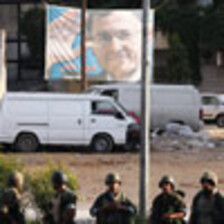Electronic Lebanon 8 December 2009

Hizballah supporters cheer as Hassan Nasrallah delivers a speech in the southern suburbs of Beirut, May 2009. (Matthew Cassel)
Last week Hassan Nasrallah delivered a speech over video link from an unknown location, as he frequently does. The leader of the Lebanese Shia Islamic resistance and political group Hizballah addressed the audience in Beirut to present the group’s new manifesto, their first since 1985 when the group unveiled its initial open letter.
The new political document, however, contained few surprises for some observers like independent Lebanese journalist Bilal el-Amine. “It’s not new for the people who have followed Hizballah over the past 20 years,” he said. “The new document only formalizes Hizballah’s process. [Unlike the 1985 letter] there is no call for an Islamic state which has been the de facto position for many years now; this shows their commitment to become an integral part of Lebanese society.”
Hizballah was founded in the early 1980s, soon after Israel’s 22-year-occupation of south Lebanon began in 1978. Initially a resistance movement aimed at liberating Lebanese territory from the Israeli occupiers, Hizballah has since become a major political party in Lebanon officially entering the government in 2005.
Nasrallah has mostly remained underground since 2006 when Israel waged war on Lebanon after Hizballah led a cross-border raid that captured two Israeli soldiers. The war lasted 34 days and devastated much of Lebanon, killing more than 1,200 Lebanese — mostly civilians — and around 120 Israelis — mostly soldiers. The war was widely seen as a victory for Hizballah, and the group’s popularity skyrocketed in both Lebanon and the region. Today, Hassan Nasrallah is considered one of the most popular political figures among Arabs and Muslims around the world.
Opponents have long accused Hizballah, which is allied with both Syria and Iran, of operating a “state within a state” and have frequently demanded that the group disarm, therefore leaving the Lebanese army as the only armed group in the country. Since the end of Lebanon’s bloody civil war in 1990, subsequent Lebanese governments have allowed Hizballah to retain its arms and serve as a resistance organization. After it was formed last month, the new Lebanese cabinet headed by Prime Minister Saad Hariri reaffirmed this right.
“Hizballah reasserted its right as a resistance group but talked about it in the context of coordination between the state, the army and the resistance,” el-Amine said. “The new document is a message to ease any worries internally in Lebanon about what Hizballah might be up to.”
El-Amine added, “the document was heavy in its use of leftist terminology, much more than Islamist language and particularly in its strong rejection of neo-liberalism.”
According to el-Amine, Nasrallah’s references to Latin America — where “Hizballah is heartened and inspired” by leftist leaders and movements that have taken strong positions against US dominance in the region — “showed that Hizballah has much broader ideas.”
Ghassan Makarem, a member of the Leftist Assembly for Change political movement in Lebanon, said the new document is representative of Hizballah’s “political wing” because “their only other document is a call for arms. This is not a call for arms, this is a call for compromises.”
“The interesting thing about the document was that it was more like an evaluation, like a closure of a phase and the opening of a new one,” Makarem said. “What Hizballah said in the document is what they’ve its doing since 2000 [when Israel withdrew from south Lebanon] at least, where it’s been entering mainstream politics step by step.”
Makarem criticized Hizballah, like most political groups in Lebanon, for paying “lip service” to initiatives aimed at eliminating political sectarianism, one of the most important issues for many Lebanese. However, few groups take practical steps to see that changes are implemented. “The document reflects a serious process of learning past lessons, but it also shows that it is more a program for [maintaining] the status quo,” he said.
“All anti-imperialists say ‘we support Hizballah when Hizballah is resisting,’ but there is a big problem supporting the other policies,” Makarem said. “They haven’t really shown that they are willing to work on real economic reform, for example, and part of this is because they’re still young politically,” he said.
Hizballah currently has two ministers in the 30-member cabinet and 10 deputies in the 128-member parliament and is aligned with other major forces in the government. Despite this influence, Makarem is skeptical as to whether or not Hizballah’s words will translate into action. “What remains to be seen is if they will use this document as their program in parliament, or if it is something only to reduce fears of the group,” he said.
Matthew Cassel is an independent journalist and photographer based in the Middle East. A version of this essay was originally published by Al-Masry Al-Youm English and is republished with permission.





